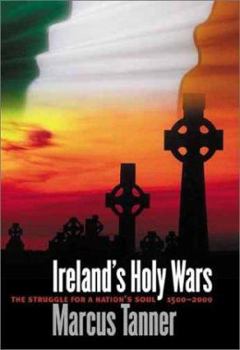Ireland's Holy Wars: The Struggle for a Nation's Soul, 1500-2000
Select Format
Select Condition 
Book Overview
For much of the twentieth century, Ireland has been synonymous with conflict, the painful struggle for its national soul part of the regular fabric of life. And because the Irish have emigrated to all... This description may be from another edition of this product.
Format:Hardcover
Language:English
ISBN:0300090722
ISBN13:9780300090727
Release Date:March 2002
Publisher:Yale University Press
Length:498 Pages
Weight:2.25 lbs.
Dimensions:1.8" x 6.5" x 9.5"
Customer Reviews
2 ratings
Ireland's Holy War
Published by Thriftbooks.com User , 16 years ago
This is an excellent book for trying to understand the problems between Ireland and England. Also the problems between fellow Irishmen: Prostestants and Catholics.
I liked it, actually
Published by Thriftbooks.com User , 21 years ago
This history of Irish religion may have trouble finding an audience. Its rather exclusive focus on Irish ecclesiastical history in the past 500 years will not satisfy readers expecting a more general account of Cromwell, King Billy of Orange, the IRA and the rest of the Troubles. Moreover, it apparently is not scholarly enough to placate more learned specialists (see other review, below). As an intermediate pupil of Irish history, however, I found this an enjoyable read. Tanner, a journalist rather than a professional historian, synopsizes some fairly dense material and keeps it lively. He is a master of the devastating thumbnail sketch. For example, the failure of the reformation in Ireland can be partly attributed to the low quality of the churchmen responsible for its implementation, such as the disagreeable, mediocre, corpulent English Archbishop of Dublin, Browne, and the slippery Irish Bishop of Cashel, Miler Magrath, who became rich from embezzlement and confiscation, and was "little better than a gangster who galloped about his diocese in armour, preceded by outriders and a man carrying a skull on a tall pole."Writing about the evangelizing Protestants during the Famine who were accused of "souperism," or buying converts with food, Tanner cites one obtuse clergyman who defended himself by boasting that not one penny of his funds had been wasted on famine relief. He became exalted preaching to one group of "living skeletons" in Connemara, who in all probability would soon become first-hand witnesses to the glory of God that he described (Tanner puts this better, but I don't have the book in front of me).The Catholic Church as well comes in for some well-deserved roasting, particularly those monumentally arrogant princes of the church who dominated the political life of the Republic until toppled by the sex scandals of the 1990s, exemplified by Archbishop Croke, an "oriental pasha" who made and unmade Parnell and other politicians.Some of Tanner's choices are indeed eccentric (why does the chapter on the disestablishment of the Church of Ireland in 1869 precede the chapter on Daniel O'Connell and his agitating priests of the 1820s?), and a few errors creep in (the patrician, peripatetic William O'Connell at one point is assigned to New York, when of course "Gangplank Bill" was Cardinal of Boston).As well, Tanner doesn't give enough credit to the churchmen, North and South, who played a crucial role in finally ending the Troubles (see last year's Secret History of the IRA), ironically when both Catholicism and Protestantism are dwindling in importance in a secular modern Ireland. (Archbishop Croke and de Valera would fulminate to see the girls of Dublin today in their miniskirts and platform shoes tottering about the discos of Temple Bar.)






